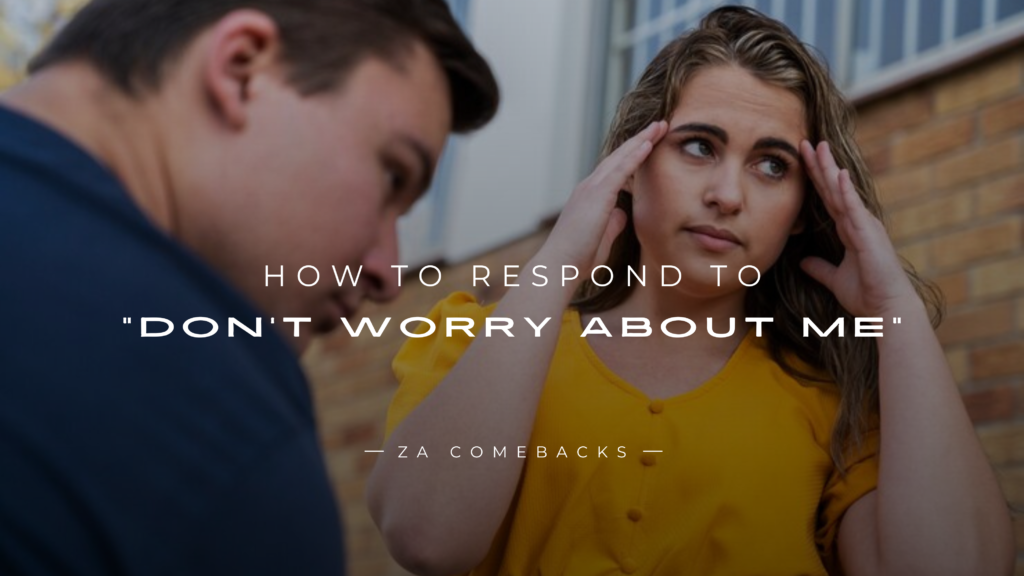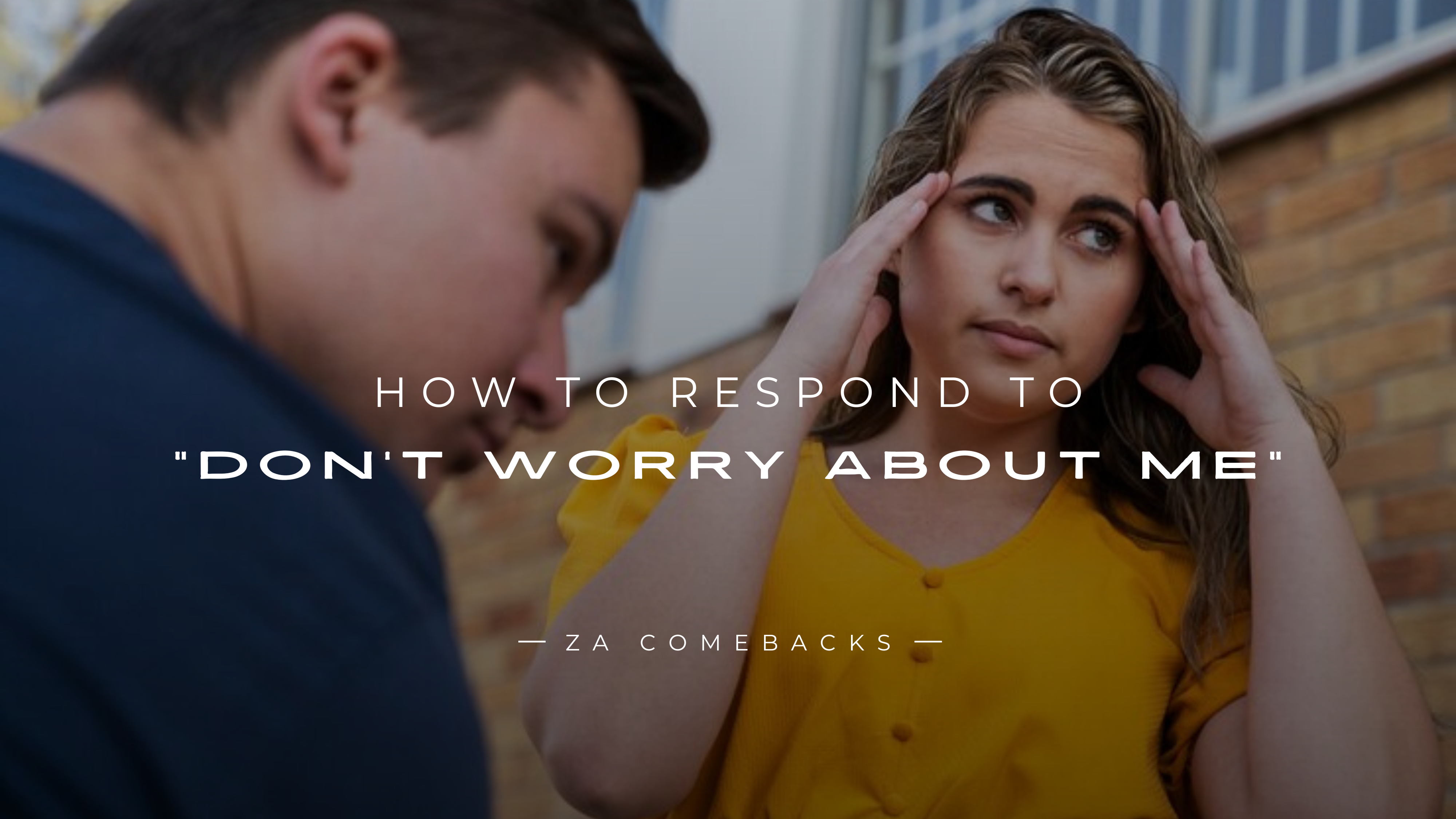In everyday conversations, we often hear the phrase “Don’t worry about me.” Whether it’s from a friend, family member, or colleague, this statement can leave us feeling unsure about how to proceed. Do they really mean it, or is there something deeper going on? Understanding how to respond to “Don’t worry about me” can strengthen relationships and ensure that you’re offering the right support without overstepping boundaries. In this guide, we’ll break down the reasons behind this phrase and offer step-by-step advice on how to respond with empathy and care.

150+ Replies to “Don’t Worry About Me”
Reassuring Replies
- You’re strong, I know you’ve got this.
- I’ll trust you on this, just take care.
- I believe in you, you’ve always handled things well.
- I know you’re capable, but remember, I’m here if needed.
- I’m sure everything will be fine, you’ve got it under control.
- You’ve got a good head on your shoulders, I’m not worried.
- No worries, I trust you completely.
- I’ll relax, because I know you’ll handle it perfectly.
- Okay, I won’t worry, I know you’ll figure it out.
- You’ve always been resilient, so I’m sure it’ll be fine.
Supportive Replies
- I’m always here if you need backup.
- No worries, just know you can reach out anytime.
- I believe in you, but you know where to find me if anything comes up.
- You don’t need to handle it alone, but I trust you can if you want to.
- I’m sure you’ve got this, but I’m happy to help if needed.
- Okay, but if anything changes, I’m just a text away.
- No problem, I’m cheering for you from here.
- I won’t worry, but you can always count on me if you need anything.
- You’ve got my full support whenever you need it.
- I know you can handle it, but I’ll always have your back.
Humorous Replies
- Who, me? Worry? Never… except always!
- Too late, I’m already in full worry mode.
- Sure, but my worry game is strong, can’t make promises!
- I’ll try, but I’m a chronic worrier—it’s basically a hobby!
- Okay, but worrying is like cardio for my brain!
- Alright, but if I don’t worry, who will?
- Don’t worry? It’s too late for that, I’m a professional worrier!
- Fine, but I’ll be worrying quietly in the background.
- Okay, I’ll try, but worrying is part of my charm!
- Deal! But I’m still keeping a secret worry journal.
Casual/Friendly Replies
- Alright, I’ll take your word for it!
- No problem, I won’t sweat it.
- Gotcha, I’ll keep calm and carry on.
- Okay, I’ll let it go for now.
- Got it, I’m cool with that.
- Sure thing, I’ll trust you on this one.
- Okay, I’ll ease off then.
- Alright, I’ll chill out about it.
- Okay, no stress here!
- Sounds good, I’m not worried.
Affectionate Replies
- You know I can’t help but worry about you a little.
- I care about you too much not to worry sometimes.
- Okay, but just because I love you, I’ll always worry a bit.
- I’ll try not to, but you’re too important to me not to worry.
- I’ll do my best not to worry, but I can’t help it—I care about you.
- You matter too much for me not to care, but I trust you.
- Okay, but you know how much I care, so I’ll always worry a little.
- I’ll try not to, but my heart doesn’t work that way!
- I get it, but I’ll always look out for you.
- Alright, I’ll try, but my care for you makes it hard not to.
Playful Replies
- Alright, but I’ll worry in secret!
- Deal, but you owe me one for not worrying.
- Okay, but I’ll be sneakily worrying from the sidelines.
- Sure, but you know I’ll still be checking in.
- Fine, but next time you worry about me instead!
- Okay, but I might still sneak in a few worry vibes.
- I won’t worry… for now. But no promises!
- Deal! But I get to worry next time, okay?
- Okay, but you owe me for not worrying this time.
- Fine, but you better give me updates so I don’t worry!
Philosophical Replies
- Worrying comes from caring, but I trust you’ll be fine.
- I’ll do my best not to, but sometimes worry is just part of love.
- Worry is just the flip side of caring—I’ll always care.
- It’s hard not to worry about those we care for, but I trust you’ll be alright.
- Caring deeply sometimes leads to worry, but I’ll trust you to manage.
- I won’t worry, but remember, worry can also be a sign of love.
- It’s part of human nature to worry about those we love, but I’ll try to trust fully.
- Worry is natural, but I’ll balance it with trust in your strength.
- I’ll let go of worry because I know you’re capable.
- Even though worry is part of care, I trust your resilience.
Empathetic Replies
- I hear you, I’ll trust you to handle things.
- I understand, I won’t push, but I’m here if you need me.
- I know you’re strong, but I’m always here if you want to talk.
- I get it, you’ve got this. But if you ever need a hand, I’m here.
- I won’t worry, but just know you can always lean on me.
- I understand, I’ll trust your judgment.
- I can tell you’ve got it under control, but I’m always here for you.
- I hear you, I’ll step back. Just let me know if you need support.
- I get where you’re coming from, I trust you completely.
- I understand, and I’ll respect that, but remember I’m always here.
Deflective Replies
- Okay, if you say so. So, what else is new?
- Got it! Now, let’s talk about something fun.
- Sure thing! So, how’s everything else going?
- Alright, let’s change the subject then.
- Okay, I’ll focus on something else. What’s on your mind?
- No problem! What’s next on the agenda for you?
- Fair enough! By the way, have you heard about…?
- Okay, let’s not worry. What’s up for tomorrow?
- Alright, moving on then! How’s everything else?
- Sure! So, what exciting things are coming up for you?
Concerned Replies
- I’ll try, but I’m still a little worried about you.
- I understand, but I can’t help worrying a bit.
- I’ll do my best, but you know I care, and that makes it hard not to worry.
- I won’t push, but I’m concerned—are you sure everything’s okay?
- I hear you, but I still feel like something’s off.
- I’ll respect that, but I’m still here if anything’s bothering you.
- I’ll try not to, but I hope you’re really alright.
- I get it, but I’m still worried because I care about you.
- I’ll give you space, but I’m here if things get tough.
- I won’t press, but please let me know if you’re really okay.
Reluctant Replies
- Okay, if you really insist… but I’ll still be thinking about it.
- Alright, but I’m not sure I can just stop worrying.
- I’ll try, but you know it’s hard for me to just switch off.
- Fine, but I’m still going to be concerned.
- Okay, but it’s tough for me not to care.
- I’ll do my best, but I can’t promise to not worry at all.
- Alright, but I can’t guarantee my mind won’t wander back to it.
- I hear you, but it’s hard for me not to worry.
- Sure, but I’ll still be a little on edge.
- Okay, I’ll try, but I can’t just shut off my concern.
Direct Replies
- Understood, I won’t.
- Got it, I’ll drop it.
- Okay, I won’t worry.
- Alright, I’ll leave it alone.
- Noted, I’ll stop worrying.
- Alright, message received, I won’t stress about it.
- Okay, I’ll leave it to you then.
- Sure, I won’t worry.
- Understood, I’ll trust you on this.
- Got it, I won’t think about it anymore.
Inquisitive Replies
- I won’t, but is everything really okay?
- Okay, but are you sure you don’t want to talk about it?
- Got it, but are you sure you’re fine?
- Alright, I’ll trust you, but what’s going on exactly?
- Okay, but you seem a little stressed. Want to share?
- I’ll let it go, but is there anything you’d like to talk about?
- Sure, but is everything truly alright?
- Okay, I trust you, but what’s on your mind?
- I won’t worry, but is there something bothering you?
- Got it, but if there’s something you’re holding back, I’m here to listen.
Encouraging Replies
- I trust you, you’ve got this!
- I’m confident you’ll handle it just fine!
- You’re more than capable, so I’m not worried.
- You always figure things out, so I’m not concerned.
- You’ve got everything under control, I believe in you.
- You’re strong and smart, I know you’ll be fine.
- You’ve handled bigger challenges, so I know you’ve got this.
- You’re doing great, no need to stress!
- You’ve got the skills to manage this, I’m sure of it!
- You’re resilient, you’ll come through this just fine.
Grateful Replies
- Thank you for reassuring me, I really appreciate it.
- Thanks for putting my mind at ease, that means a lot.
- I appreciate you telling me not to worry, it helps.
- Thanks for calming my nerves, I trust you.
- Thank you for understanding, I’m grateful for your reassurance.
- I appreciate your confidence, it really puts me at ease.
- Thank you for letting me know, it helps me feel better.
- I’m grateful for your reassurance, it means a lot to me.
- Thanks for being so reassuring, I appreciate it.
- Thank you, it’s comforting to hear you’ve got it handled.
Why Do People Use the Phrase “Don’t Worry About Me”?
At its core, “Don’t worry about me” often reflects more than what meets the eye. It’s a phrase that can be rooted in emotional self-protection. People may say it when they don’t want to feel vulnerable, or they might be trying to avoid burdening others with their problems. Sometimes, it can be a defense mechanism, a way to maintain control over their feelings or to avoid diving into a deeper conversation.
- Emotional Self-Protection
For many, saying “Don’t worry about me” serves as a way to shield themselves from the discomfort of opening up. It’s their way of signaling that they may not be ready to talk or are still processing their emotions privately.
- Avoiding Vulnerability
Vulnerability can be intimidating. When someone uses this phrase, it may be because they don’t feel comfortable exposing their innermost thoughts and feelings, fearing judgment or pity.
- Desire to Not Burden Others
Sometimes, people genuinely don’t want to impose on others. They may believe that their problems aren’t important enough to trouble someone else, or they may fear that sharing could lead to others feeling overwhelmed.
The Impact of the Phrase “Don’t Worry About Me” on Relationships
Hearing this phrase can cause a ripple effect in relationships. Miscommunication and emotional distance can arise if it’s left unaddressed. When people repeatedly tell you not to worry, it can make it difficult to show empathy or concern, creating a barrier to deeper connections.
- How It Affects Empathy and Concern
By telling someone not to worry, they may unintentionally cut off the emotional support they need. While the phrase sounds reassuring on the surface, it can make the person offering support feel disconnected or unsure about how to proceed.
How to Respond with Empathy
The first step in responding is practicing active listening. Rather than jumping to conclusions, allow the person to express themselves fully. By doing this, you create a space where they feel comfortable opening up when they’re ready.
- Importance of Active Listening
Active listening involves more than just hearing the words—it’s about picking up on tone, body language, and underlying emotions. Nod your head, make eye contact, and let them know you’re truly present.
- Non-Verbal Cues to Show Care
Sometimes, what you don’t say speaks louder than words. A gentle nod, a soft smile, or simply being present without saying anything can convey that you’re there for them.
- Validation of Their Feelings Without Pushing
When responding, it’s crucial to validate their emotions without pressing them to share more than they’re comfortable with. You can say something like, “I understand you might not want to talk right now, but I’m here if you change your mind.”
Assessing the Situation
One of the challenges in responding to “Don’t worry about me” is figuring out whether the person genuinely doesn’t want to talk or if they’re masking their true feelings. Sometimes, it’s not about pushing harder but about gently probing to see if they’re willing to share more.
- Is it a Genuine Request, or a Defense Mechanism?
To determine this, look for patterns. If they consistently say this but exhibit signs of stress, they might be using the phrase as a defense mechanism. In such cases, providing them with gentle encouragement can make a difference.
- Reading Between the Lines
People often communicate through more than just words. Pay attention to their body language, tone of voice, and even silence. These can offer clues about how they’re really feeling.
When to Respect the Request
Sometimes, the best way to show support is to respect their boundaries. If someone insists that you shouldn’t worry, it’s essential to honor that request—at least for the time being.
We all have different thresholds for how much we’re willing to share. Recognizing and respecting those boundaries can strengthen your relationship by showing that you trust their judgment.
- Avoiding Overstepping
Pushing too hard can cause discomfort and potentially damage the relationship. If someone isn’t ready to talk, let them know you’re available when they are.
What to Say Instead of “Are You Sure?”
Asking, “Are you sure?” can feel dismissive or insistent. Instead, use open-ended questions or statements that invite conversation without being intrusive. Try something like, “I’m here if you ever need to talk” or “It seems like something’s on your mind, but I respect your space.”
Offering Support Without Being Overbearing
Balancing care with respect for someone’s independence can be tricky. Offer practical support, such as running errands, but ensure it doesn’t come across as you taking over or doubting their ability to manage.
- Ways to Offer Help Without Pushing
You can suggest specific forms of help, like, “Would it help if I brought over dinner tonight?” instead of the vague “Let me know if you need anything.”
- Balancing Care with Respect for Their Independence
Empathy doesn’t mean assuming someone is incapable of handling their own problems. Show that you trust their ability to cope, but you’re there for backup.
Responding with Reassurance
If someone says “Don’t worry about me,” they might be looking for reassurance without having to spell it out. A good response is something that acknowledges their independence while showing that you still care deeply.
- How to Make Them Feel Heard and Supported
Acknowledging their request without dismissing your concern is key. A phrase like, “I won’t push, but I’m always here for you” provides reassurance without pressure.
- Using Language That Builds Trust
Use language that emphasizes togetherness, such as, “We’ll get through this together” or “You don’t have to handle this alone.”
The Role of Emotional Intelligence
Emotional intelligence plays a critical role in handling delicate conversations like this. Being attuned to subtle emotional cues helps you navigate responses that fit the situation.
- How Emotional Intelligence Helps Navigate Sensitive Responses
By tapping into emotional intelligence, you’re better equipped to sense when to push and when to pull back. This skill helps you understand emotions even when they’re unspoken.
- Learning to Interpret Unspoken Emotions
Sometimes, what isn’t said carries more weight. Be mindful of changes in mood, hesitation, or facial expressions to guide your response.
Non-Verbal Communication in Responding
Non-verbal communication, like body language and facial expressions, plays a huge role in showing someone you care.
- Importance of Body Language and Facial Expressions
Maintaining open body language and soft eye contact can show that you’re approachable and empathetic, even if words aren’t exchanged.
- Using Touch (If Appropriate) to Convey Support
In some cases, a gentle touch on the arm or a hug can offer the comfort they need without saying a word.
The Fine Line Between Support and Prying
You want to be helpful, but no one likes to feel like they’re being pried open. It’s a fine line to walk, but it’s essential to recognize when your support might be crossing that line.
- Knowing When to Back Off
Watch for signs that they’re uncomfortable or withdrawing further. If they pull away, take it as a signal to give them space.
Ensure your offers of support are casual and low-pressure. Use phrases like, “Only if you want to” or “Whenever you’re ready.”
Encouraging Open Dialogue
Creating an environment where someone feels safe to share is the best way to encourage them to open up.
- How to Create a Safe Space for Sharing
Foster an atmosphere of trust by consistently showing that you’re non-judgmental and patient. Let them come to you on their terms.
- Encouraging Them to Open Up When They’re Ready
You can say something like, “I’m always here to listen, whenever you feel like talking.” This shows that you’re available without imposing.
Long-Term Effects of Addressing “Don’t Worry About Me”
Addressing “Don’t worry about me” in a thoughtful and caring manner can have lasting positive effects on your relationship. Trust and emotional resilience are built over time through careful responses.
- Strengthening Trust in Relationships
When you respond with empathy and respect, it reinforces trust, making it easier for them to open up in the future.
- Building Emotional Resilience Together
By providing consistent support, you help them—and your relationship—become more emotionally resilient over time.
Conclusion
In conclusion, knowing how to respond to “Don’t Worry About Me” can help you express care, reassurance, or even add a touch of humor depending on the situation. Whether you’re offering comfort, showing support, or gently easing someone’s concerns, having the right words can strengthen your connection and let them know you’re truly there for them. If you ever face a situation where someone expresses concern for you instead, you may also find it helpful to explore How to Respond to “I’m Worried About You” : 150+ Replies for thoughtful and effective responses.
FAQs
Q. What should I do if someone frequently says “Don’t worry about me”?
If someone frequently uses this phrase, it might be a sign that they’re struggling with something deeper. Be patient, offer consistent support, and create a safe space for them to share when they’re ready.
Q. How can I tell if someone really means “Don’t worry about me”?
Pay attention to their body language, tone of voice, and other non-verbal cues. If they seem distressed or their actions contradict their words, they might be masking their true feelings.
Q. Can over-concern damage a relationship?
Yes, being overly concerned or pushing too hard can make someone feel pressured or smothered. It’s important to find a balance between offering support and respecting their autonomy.
Q. What’s the best way to handle my emotions when someone says this?
It’s natural to feel frustrated or worried when someone says, “Don’t worry about me.” Focus on providing support while managing your own concerns, perhaps by seeking advice or sharing your feelings with someone you trust.
Q. How can I balance caring without overstepping boundaries?
Respect their boundaries by offering help without being intrusive. Phrases like, “I’m here for you, whenever you’re ready” can strike the right balance between care and respect.









